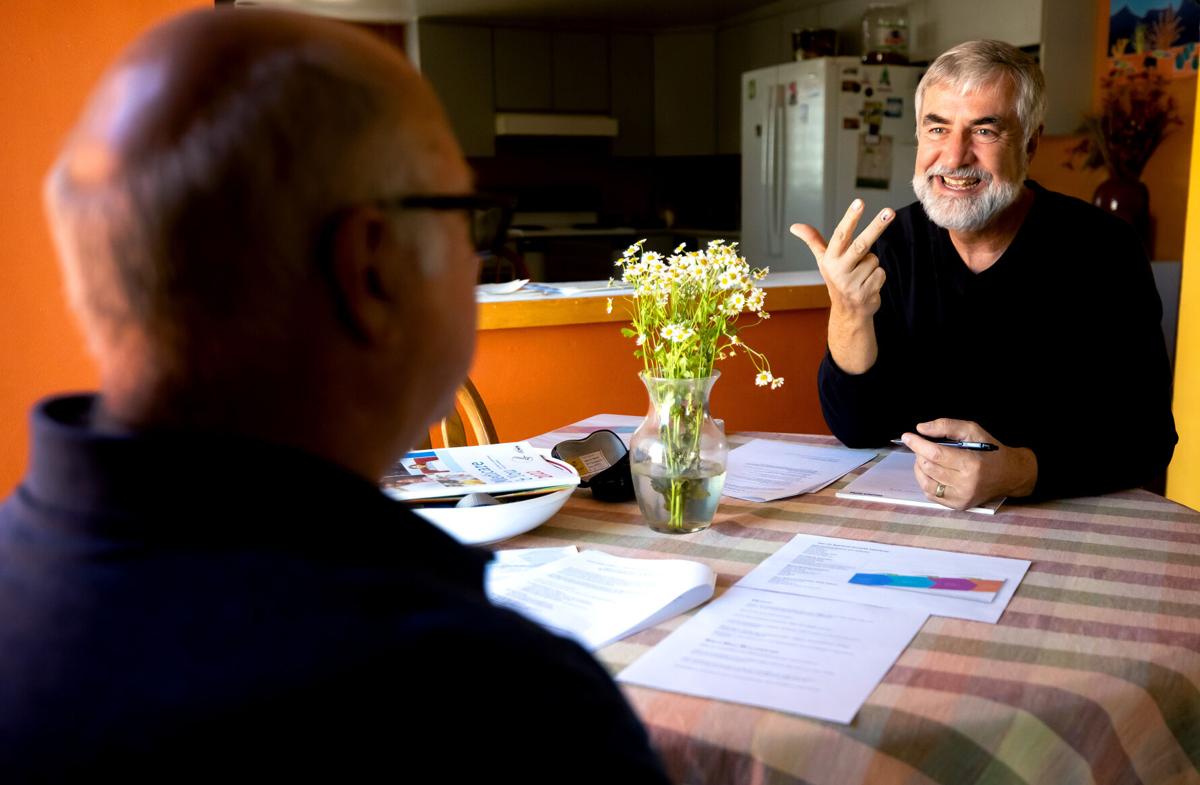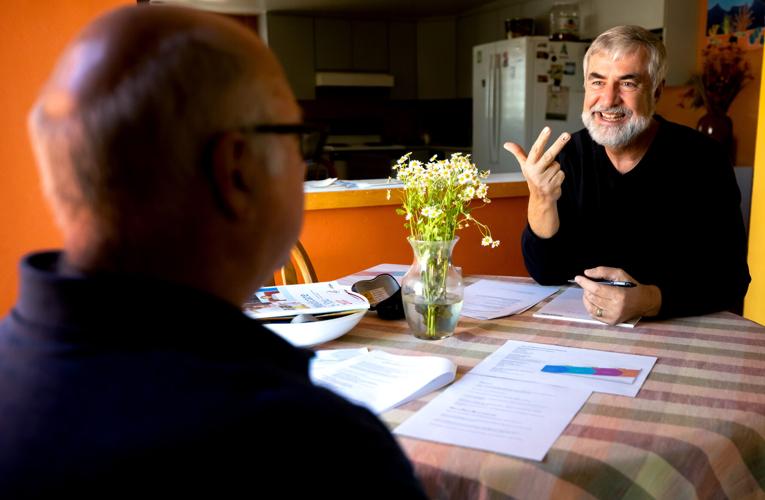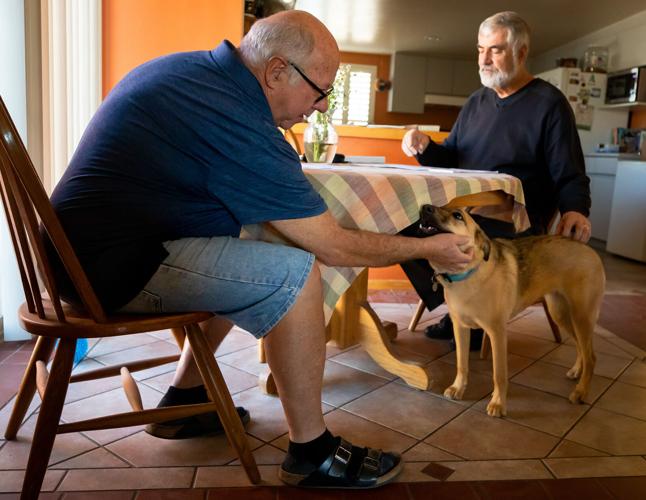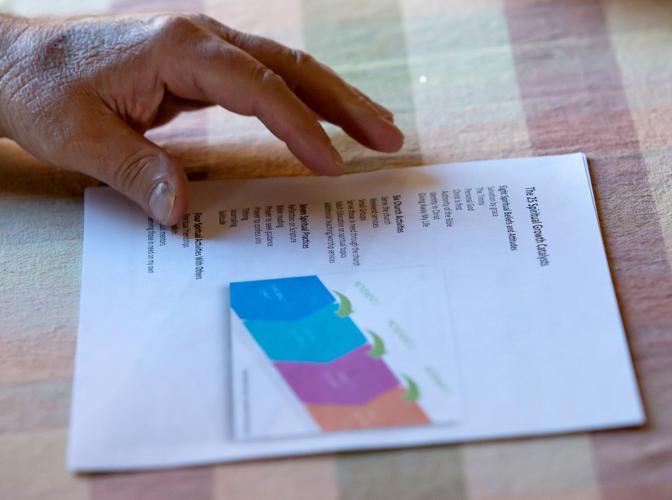Fred Nelson was a volunteer chaplain at Stateville Prison in Joliet, Illinois, several years ago when he found a new calling: addressing the criminal justice system's invisibility problem.
"People in prison "couldn't easily see the available help for them that was out there," Nelson said. "And because it was invisible to them, they went through a lot of chaos and had a very bumpy landing when they came outВ and that took an enormous human toll on people's health, their family relationships and more."
At the same time, local service providers had help available and programs that were underutilized.
"People were sleeping under underpasses and 2 miles away, a sober living facility had empty beds and was struggling to make ends meet because they needed 80% of their beds filled," Nelson said. "So what do you do about invisibility?"
People are also reading…
For Nelson, the answer was relocating to Tucson and creating a free online network that connects people in ГЫБДЦұІҘ and Illinois prisons with local service providers, similar to a dating site.
Nelson's program, the Inside Out Network, lets incarcerated individuals search for the services they're seeking and directly message providers who match their search criteria. Service providers are also able to find people in prisons through the network who are looking for the services they provide.
While the system still isn't perfect, nearly 1,600 ГЫБДЦұІҘ inmates have enrolled since its rollout in June, and Nelson is working to improve the program in ГЫБДЦұІҘ while also expanding it to other states.
"We're trying to to address a nationwide problem with a local touch," Nelson said.
"Pathways to make changes"
While the United States makes up just 5% of the world's population, U.S. citizens account for 25% of the world's imprisoned individuals, Elizabeth Glazer, former Director of the New York City Mayor's Office of Criminal Justice, said during the Harry Frank Guggenheim Symposium on Crime in America at John Jay College on March 3.
The nonprofit organization The Sentencing Project reports that there are 2 million people in the nationвҖҷs prisons and jails, and in May 2021, the ГЫБДЦұІҘ Department of Corrections reported that 36,266 men and women were incarcerated in state prisons at a rate of 877 people per 100,000 вҖ” the eighth highest per capita incarceration rate in the world.
But each year in the United States, 650,000 people are released from prisons, many of whom need some kind of service or assistance.
Nelson started doing prison missionary work in 2005, saying he felt God nudging him toward the cause. He resisted at first, but had told a member of his church about his feelings and that member held Nelson accountable, telling him, "You just have to do it."
A decade later, Nelson and some members of his congregation at Redeemer Lutheran Church took the first step in addressing the invisibility problem, creating a roadmap вҖ” at the request of the City of Chicago вҖ” for inmates transitioning out of Stateville.
"It gave people pathways to make changes," Nelson said of the document, which included only providers who were willing to work with people who had felony convictions. "We did about 10,000 directories, and the state of Illinois' Department of Corrections asked if we could do it for the whole state."
Because the document wasВ a long and laborious volunteer effort and Nelson's church was small, he turned the DOC down. But the proposition got him thinking how he could take the program to another level through the use of technology.
While recovering from back surgery, Nelson had time to slow down and put some thought into the program and what it would take to create a multisided platform similar to a dating site, where people in prison could create profiles and select the kind of help they're looking for. Once the program found the relevant matches and the initial connection was made, the relationship would move offline and a release plan could be put into place.
Fourteen years after he first stepped foot inside Stateville, Nelson was so involved in the work that he shifted away from full-time church ministry and made the move to Tucson to put all of his work into getting the Inside Out Network off the ground.
Nelson reached out to a connection in Chicago for some pro bono legal help. He then reached out to ГЫБДЦұІҘ State University's School of Criminology and Criminal Justice to see if they'd be interested in working with him as a community partner.

Thanks to the help of ASU interns who are paid a modest stipend, Nelson was able to launch the network in Illiniois in 2019, and it was up and running in ГЫБДЦұІҘ by June 2021. He's since hired two of those former interns to work as program coordinators for each state, and is in talks with three other states.
Participation in the Inside Out Network is free for people in prisons, their family members or people who were recently released, and there's no cost to the various states' Department of Corrections. The first year of membership is free for service providers, and after that, the subscription fee is $100 per yer.
The program relies partly on grant funding and donations, but the subscription fee for service providers is part of the long-term strategy to keep the network funded, Nelson said.
In the last year, 3,000 people in ГЫБДЦұІҘ and Illinois prisons have registered for the network, and Nelson expects double that amount this year.
One-stop shopping
Will Nieves, pastor at Gate Outreach Ministries, works with Nelson on the Pima County Reentry Coalition and various statewide coalitions helping to connect returning citizens with services.
As someone who spent 17 years in prison, Nieves, who was released in 2009, said he was sold on the network from the moment Nelson presented the idea.
"I believe it's the best thing to happen to the inmate population ever," Nieves said. "That kind of availability inside is unheard of."

A person who was recently released from incarceration gives their 10-month-old puppy Maggie some attention during a coaching meeting with Fred Nelson, executive director of Inside Out Network and part-time pastor for New Spirit Lutheran Church.
Nieves said people on the inside often struggle to find the resources they need, and having a free, one-stop shop like the Inside Out Network is a game-changer.
"He's a pioneer," Nieves said of Nelson. "He engages them on the inside and I care for them on the outside."
At Gate, Nieves runs a faith-based home for returning citizens, with the doors open to everyone. Gate works with its participants to help them find jobs and support them with their transition back to the community.
"People talk about all that they want to do to help the guys coming out, but it's always attached to strings. We'll give you this if you go to classes or do that," Nieves said. "If we just tend to and love and help these guys find their purpose in life, I think that's the first step to their success."
While Nelson acknowledges the significance of the network and its ability to help thousands of incarcerated individuals get a head start on their release plan, he's quick to deflect praise.
"I'm not the hero. The heroes are the men and women that are trying to do chapter two or chapter five of their lives and those working on the frontlines every day to make it happen," Nelson said.
Working out the kinks
Phoenician Brett Matossian, founder of the valley nonprofit ReEntry by Design, said the way the state handles reentry is all wrong, with efforts to help returning citizens starting far too late.
"We need to start earlier, far sooner before they hit the gate," Matossian said. "We need to walk with them and create reentry plans that are personalized."
ReEntry by Design works with incarcerated individuals to create comprehensive, personal reentry plans thatВ people want to invest in because they're theirs, Matossian said.
He knows this model is effective from personal experience, having spent five years in prison for financial crimes before his release in 2013.
Matossian began working in peer support after he left prison and, in the fall of 2020, made the decision to start his own nonprofit.
"I've seen what's working and what's not working, and things have to be done differently," Matossian said. "We have to find out where they came from, how they got here and help them change their perspective on the future."
Matossian met Nelson after he launched the Inside Out Network in ГЫБДЦұІҘ last summer, saying what the network brings to the table is highly needed.
"In theory, this program is phenomenal, once it evolves and the ADOC... allows individuals to enroll themselves and access their messages on the platform," Matossian said.
As of now, inmates have to be allowed access to a computer in prison to sign up for the program and receive messages through their network dashboard.

A person who was recently released from incarceration examines paperwork given to them by Inside Out Network Executive DirectorВ Fred Nelson
Mattosian called it a barrierвҖ“ but not a dealbreakerвҖ“ for providers like ReEntry by Design, and one that they quickly learned to overcome by messaging the person on their prison-issued tablet. ГЫБДЦұІҘ prisons contract with a company called Securus technology to provide "eMessaging," which is similar to email, and video visitations via inmates' tablets.
The downside to the workaround is that those messages cost the inmates and service providers money to send and receive. And when it comes to allowing inmates use of computers to create a profile within the network or check their dashboard for messages, it's not as easy as it sounds, Matossian said.
"They're overworked, and getting someone enrolled in the network takes time," Matossian said.В
Getting more corrections officers on board with the benefits of the program as a tool to reduce recidivism would go a long way into getting more individuals inside the prisons signed up, Matossian said.
The network helps people in prison start planning their life post-release, which is an important step that often is overlooked. Now, it's just a matter of getting the ADOC to expand access to the program, of which Matossian said he's hopeful.
"I have great things to say about what I've seen from the DOC lately, with incredible shifts in perspective about what they're going to do about assisting individuals preparing to leave," he said. "Fred has hit some of the barriers head on, and for the DOC, this is a big shift."
"I can't help him, but I can help someone else"
Miranda Campos, the network's ГЫБДЦұІҘ Program Manager, has been with the network since 2020, when she was attending ASU to earn her master's degree. With reentry being a personal passion, Campos jumped at the chance to get involved with Nelson's project.
"Earlier that year, someone very close to me who had been incarcerated most of his life passed away," Campos said. "When I saw this internship, I thought this was God's way of helping me through it. I can't help him, but I can help someone else."
Campos interned for two semesters and was happy to accept a full-time position at the start of 2021. Her job is to reach out to service providers to help expand the database and to network through reentry coalitions and other community groups.
She said she enjoyed watching the network's slow and steady growth its first two years, but its been amazing to see the program really take off in this last year.
Campos said she and Nelson are working with their contacts at the ADOC to improve access to incarcerated individuals, but in the meantime, they help family and friends to create profiles from outside prison to get the ball rolling on a release plan.
"It's wonderful to see the reentry community that's out there with so many passionate individuals," Campos said. "It's so rewarding getting people together and being a one-stop place for justice-involved people to find providers that want to help them with their reentry."
Nelson said he hopes when people preparing for their release sign onto their dashboard and see the network of support waiting for them in the community, it will inspire them to work toward the future they want.
"People feel empowered by seeing the help they were looking for before," Nelson said. "They're able to feel in control of things, rather than sit passively, and lean into their future and take responsibility for that."
Caitlin Schmidt is the Star's solutions reporter, focusing on potential approaches or solutions to social issues and problems. Contact her at 520-573-4191 or cschmidt@tucson.com. On Twitter: @caitlincschmidt


























